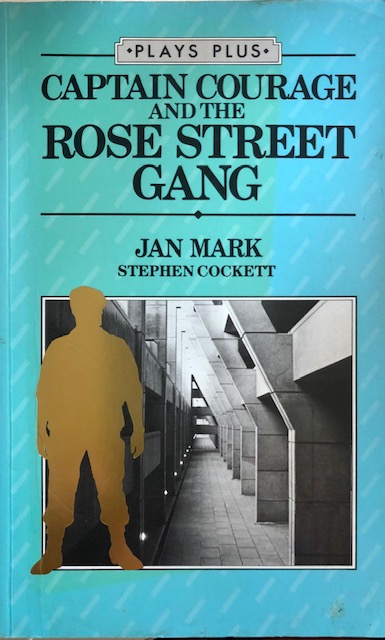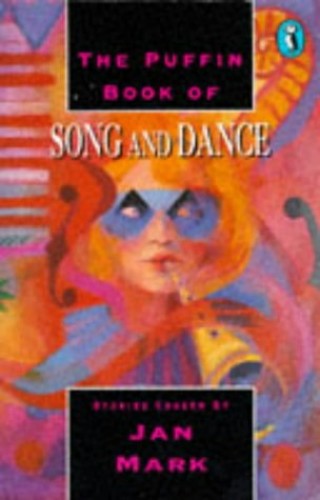
At Ashford Grammar School in the 1950s, Jan’s favourite teacher, Mary Mitchell, was passionate about the theatre – particularly Shakespeare – which inspired Jan. She developed an interest in directing and staging productions, in addition to performance. And in writing, of course. You can read more about this part of her life in the account written for this website by her friend Jane Sherman.
As a teacher, Jan wrote plays for the students which she described as ‘comedies with lots of fights’ and once she became a professional writer, developed playscripts for professional performance, including, The Weathermonger (adapted from Peter Dickinson’s novel), Time and the Hour and The One That Got Away (adapted from her own stories), as well as the original playscripts, Izzy, Interference and Captain Courage and the Rose Street Gang. She also wrote for television, including an episode of The Frighteners (‘If You Meet a Fairy’). All of these productions made full use of her enviable skills in dialogue.
She wrote about putting on plays in prose, too – her short story ‘Dan, Dan, the Scenery Man’ is one of her best (you can read it in The One That Got Away); it was the story of her own she included in The Oxford Book of Children’s Stories so it must have been a favourite – for its subject matter, perhaps, as well as its form.
Shakespeare abides: Heathrow Nights has its origins in Hamlet. ‘I Was Adored Once Too’ (a short story in Feet) takes its title from Sir Andrew Aguecheek’s line in Act II, Scene III of Twelfth Night. It’s a witheringly funny story about the behind-the-scene tensions as art imitates life in a secondary school’s rehearsals:
‘Birkett played on his dimmers with the love and skill of a virtuoso violinist, making night and day, the greater light and the lesser, with the tenderest touch of his long and flexible fingers. The woodwork master, now Stage Manager, was well aware of this, which was why he had given Birkett the lighting plot instead of doing it himself. As far as Andy Capp was concerned, Birkett was marooned on top of his ladder because he could do less damage here than he could on-stage, mangling Shakespeare.’
Stratford Boys – Jan’s glorious how-it-all-began tale of a young Will Shakespeare – has its own page on this website.
However, you might not know Mr Dickens Hits Town, illustrated by Regolo Ricci, published by Jan’s great friend Kathy Lowinger at Tundra Books in 1999, but not distributed in the UK. It’s a cross between a picture book and short novel, illustrated in colour on each spread. The jacket copy begins with a question that Jan explored in her novel Dream House, set in an artists’ retreat and course centre which attracts celebrities to mingle with and inspire would-be creatives:
‘Why do people react so oddly in the presence of the famous?’
The blurb for Mr Dickens Hits Town continues:
‘Like everyone else, young Dorothy is thrilled that Mr Charles Dickens would be making a stop in Montreal after the first “media” tour of North America – complete with fans and fawning, nosy reporters. However, she soon realizes that coping with fame, and the famous is a mixed blessing.
‘Based on historical fact, writer Jan Mark describes Dickens’s brief and hilarious time with the amateur theatrical company of the British garrison stationed in Montreal. Dickens was, to say the least, a handful for his eager hosts. He overruled everyone in the choice of plays they were to perform he took all the best roles for himself (including the nicest costumes); he even raided people’s homes for furniture for the sets. How did he get away with it? No one knew how to say no to someone so very famous.’
It’s a typically acerbic story, focused on a loveable but disparate family, the Perrys – Mary, the elder, social climbing sister and the younger, more sanguine Dorothy, who is initially disappointed by the garish Mr Dickens and his beleaguered wife. The backstage machinations – the grumbling, the griping – are wittily entertaining as the production progresses towards its debut.
And so we come to another book about the performing arts, The Puffin Book of Song and Dance, an anthology edited and introduced by Jan:
‘If you write books or paint pictures or carve statues it can be weeks, months or even years before anyone sees what you have created, by which time you will be somewhere else, creating something else. With the performing arts, such as music, dancing and drama, you are watched. Whatever it is that you do, you need an audience. (No one ever paid good money to watch an author writing a book.)
Penguin had approached a number of writers to compile anthologies on different themes, including Nicholas Fisk (Science Fiction), Gene Kemp (Ghosts and Ghouls), Helen Cresswell (Funny Stories) and Bernard Ashley (School Stories).
The contents are the short stories: ‘The Poppycrunch Kid’ by Adèle Geras, ‘The Greatest’ by Michelle Magorian, ‘William Holds the Stage’ by Richmal Crompton, ‘Hear My Voice’ by Dennis Hamley, and ‘The Man Who Understood Cats’ by Adrian Arlington
There are extracts from the following novels: The Fact and Fictions of Minna Pratt by Patricia Maclachlan, The Enchanted Castle by E. Nesbit, She Shall Have Music by Kitty Barnes, A Swarm in May by William Mayne, A Little Lower Than the Angels by Geraldine McCaughrean. And …
‘… there is someone who does not act or dance or sing. Anna [in Betsy Byars’ The Glory Girl] comes from a family of gospel singers, but she is the one without a voice who has to stand at the back and sell records and tapes to the audience after a show.’
Jan had a soft spot for salespeople – I remember her telling me, with pride, that both her children were excellent salespeople. Jan herself was a formidable force as a volunteer at the Oxfam Bookshop every Saturday morning. Surely a kind of performance in itself? (She fondly recaptured the experience of working in a pub in her student days in At the Sign of the Dog and Rocket.)
All in all, however, I suspect that Jan was probably glad that she chose a profession where the making wasn’t watched but the results stood on their own terms for all to judge.






